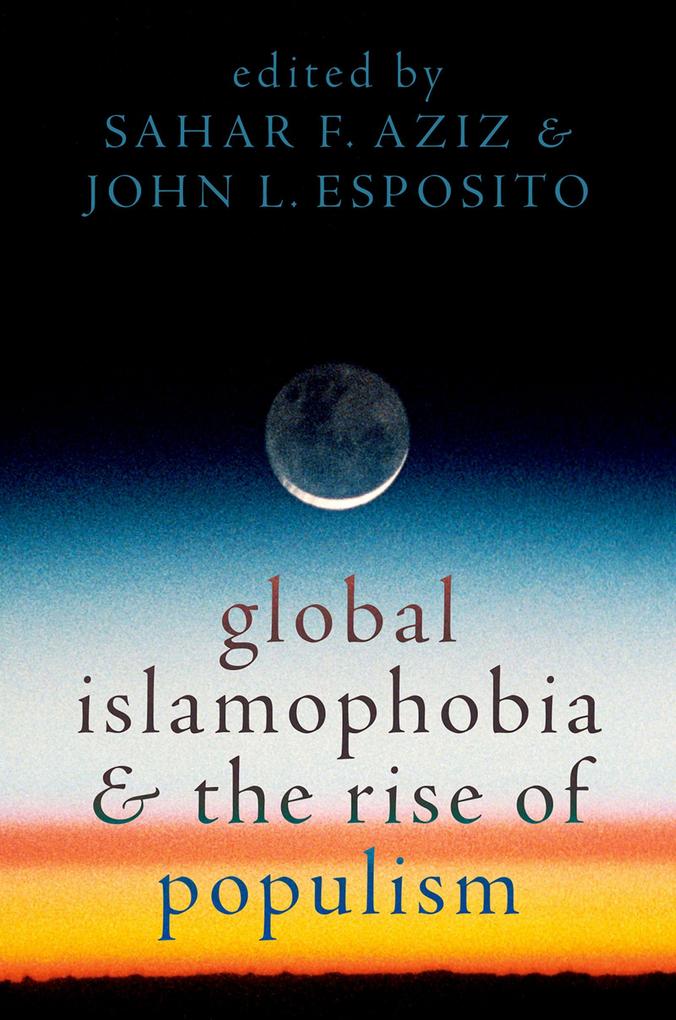
Zustellung: Mi, 11.06. - Fr, 13.06.
Sofort lieferbar
VersandkostenfreiBestellen & in Filiale abholen:
Islamophobia is an escalating problem worldwide, arising from a convergence of right-wing populism, xenophobia, and the normalization of anti-Muslim scapegoating. A must-read for anyone concerned with the erosion of human and civil rights, Global Islamophobia and the Rise of Populism is the first to tackle these complex phenomena on a worldwide scale through empirically supported analysis by internationally renowned scholars.
In recent years, Islamophobia has seen a disturbing global rise. Blaming Muslim minorities for economic, political, and social problems is an increasingly common rhetorical strategy for politicians in countries worldwide. A narrative of the "threatening Muslim invader" is troublingly prevalent, regardless of whether the targets of such rhetoric are born citizens or new arrivals.
Its consequences are deadly and devastating for Uyghurs in China-indefinitely detained in concentration camps-Indian Muslims attacked in pogroms, and the Rohingya victims of genocide. In parts of Europe and North America, the consequences of Islamophobia are less overtly violent but no less harmful: Muslims are banned from wearing hijab, building minarets, opening Islamic schools, or legally immigrating to certain countries. In the United States, Europe, and India, Islamophobic rhetoric is increasingly normalized, fracturing ethnically diverse societies as xenophobic right-wing political ideals accumulate followers at an alarming pace. In turn, Islamophobia in the West gives license to discrimination elsewhere, creating a vicious cycle of Islamophobia.
Global Islamophobia and the Rise of Populism is the first book to systemically examine the complex factors contributing to the rise in Islamophobia and right-wing populism across three continents-North America, Europe and Asia. Internationally renowned scholars offer insightful and empirically grounded analysis linking local contexts with global trends. This groundbreaking book is an essential contribution to discourse on immigration, racism, xenophobia, and human rights.
Its consequences are deadly and devastating for Uyghurs in China-indefinitely detained in concentration camps-Indian Muslims attacked in pogroms, and the Rohingya victims of genocide. In parts of Europe and North America, the consequences of Islamophobia are less overtly violent but no less harmful: Muslims are banned from wearing hijab, building minarets, opening Islamic schools, or legally immigrating to certain countries. In the United States, Europe, and India, Islamophobic rhetoric is increasingly normalized, fracturing ethnically diverse societies as xenophobic right-wing political ideals accumulate followers at an alarming pace. In turn, Islamophobia in the West gives license to discrimination elsewhere, creating a vicious cycle of Islamophobia.
Global Islamophobia and the Rise of Populism is the first book to systemically examine the complex factors contributing to the rise in Islamophobia and right-wing populism across three continents-North America, Europe and Asia. Internationally renowned scholars offer insightful and empirically grounded analysis linking local contexts with global trends. This groundbreaking book is an essential contribution to discourse on immigration, racism, xenophobia, and human rights.
Inhaltsverzeichnis
- Foreword, by Barbara A. Lee
- 1. Introduction
- Part 1 Islamophobia in North America: Race, Religion, and Citizenship
- 2. The Price of Recognition: The One Islam and the Many
- Joseph Massad
- 3. The Politics of Vulnerability: Today's Threat to American Muslims' Religious Freedom
- Asma T. Uddin
- 4. Islamophobia and the Rise of Ethnonationalist Populism in the United States
- Saher Selod
- Part 2 Islamophobia in Europe: Xenophobia, Anti-Semitism and Nationalism
- 5. Post-Colonialism, Post-National-Socialism, German Reunification, and the Rise of the Far-Right: Making Sense of Islamophobia in Germany
- Farid Hafez
- 6. Islamophobia: How the Far Right Went Mainstream in Britain
- Mobashra Tazamal
- 7. France's Islamophobic Bloc and the "Mainstreamization" of the Far Right
- Marwan Mohammed
- 8. Islamophobia Without Muslims? Not Only in Eastern Europe
- Ivan Kalmar
- 9. Islamophobia in Russia: Ethnicity, Migration, and National Security
- Sahar F. Aziz and Sarah Calderone
- 10. Muslim Life in Belgium: In Search of a Vivre Ensemble
- John Farmer and Ava Majlesi
- Part 3 Islamophobia in Asia: Genocide, Pogroms, and Detention
- 11. Displacing and Disciplining Muslims in India's Burgeoning Hindu Rashtra
- Audrey Truschke
- 12. Contesting the Spatialization of Islamophobia in Urban India
- Stuti Govil and D. Asher Ghertner
- 13. (Un)Made in China: Uyghur Muslims at the Intersection of Islamophobia and Ethnic Cleansing
- Khaled A. Beydoun
- 14. Islamophobia and Genocide: Myanmar's Rohingya Genocide
- Ronan Lee
- Conclusion: Lessons from South Africa
- 15. Confronting Islamophobia: Defeating Colonial Bigotries, Learning From South Africa
- Ebrahim Rasool
- Index
Produktdetails
Erscheinungsdatum
29. August 2024
Sprache
englisch
Seitenanzahl
x
Herausgegeben von
Sahar F. Aziz, John L. Esposito
Verlag/Hersteller
Produktart
kartoniert
Gewicht
389 g
Größe (L/B/H)
325/253/2 mm
Sonstiges
Print PDF
ISBN
9780197649008
Entdecken Sie mehr
Bewertungen
0 Bewertungen
Es wurden noch keine Bewertungen abgegeben. Schreiben Sie die erste Bewertung zu "Global Islamophobia and the Rise of Populism" und helfen Sie damit anderen bei der Kaufentscheidung.









